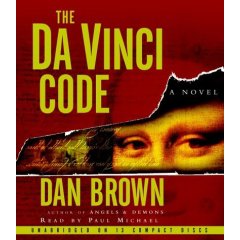
Here's a book that has inspired a wee bit of controversy, The Da Vinci Code by Dan Brown. When I was in school, a good friend of mine's brother was named Dan Brown -- not the same guy. Anyway, even though I'm sure you can find more and better information on this book elsewhere, I'll cut to the chase and get to the story:
American professor Robert Langdon is visiting Paris when he's awaken from his hotel room and summoned to the Louvre, where he discovers that he's a suspect in the murder of the museum's curator, Jacques Saunière. With the help of police cryptologist Sophie Neveu, he escapes the Louvre. Langon and Neveu try to stay ahead of the police and a mad monk while investigating clues and trying to determine who is the real killer. With the help of historian Sir Leigh Teabing, they find themselves on a quest for the Holy Grail, which is also sought after by the mysterious "Teacher" who seems to be pulling all the strings.
Apart from flashbacks, and a short epilogue, the entire book takes place over the course of a day; most of that over less than 12 hours.
As an action novel, it's not bad. I've read better though, and I haven't read a lot of the genre.
What the book is most known for, however, is the stance its characters take on Christianity. Basically, the characters claim, everything you have been taught about Christianity is false. This gets tedious at times. It seems to me that it's a sign of less than stellar writing when you have professors and historians whose role seems to be explaining things to other characters. In this case, poor old Sophie is usually the vicitim having to endure Teabing's and Langdon's long-winded explanations concerning the supposed marriage of Jesus and Mary Magdalene, their descendants, how this "truth" was hidden, and what the Holy Grail has to do with all of this.
What's my take? It's basically that the author has a good imagination. What if history was really like this, and there really was a 900-year old "Priory of Sion", he seems to asking. Critics of the book apparently think that readers will take Brown's characters' claims as the truth, or an equally valid telling of history. I don't know anyone like this, but I suppose they're out there. If you don't feel comfortable with your knowledge of early Church history, I recommend a book like Exploring the Da Vinci Code by Strobel & Poole (but not necessarily that one).
Since there is so much baggage associated with this book, I can't really give it a rating or a recommendation. If you're looking for a fast-paced action novel, I'd prefer something by Michael Crichton. But if you feel comfortable with your knowledge of history and want to see what the hubub is about, I won't try to dissuade you.
No comments:
Post a Comment